 There has been much rumblings of discontent from content suppliers to the mobile phone industry, and, as the globally dominant brand, Vodafone have been taking a lot of the flack.
There has been much rumblings of discontent from content suppliers to the mobile phone industry, and, as the globally dominant brand, Vodafone have been taking a lot of the flack.
With sales soaring through the roof, you’d think all would be cream cakes and Earl Grey tea in Mobile Land, but trouble’s been a-brewing concerning the split of income from subscribers for the content.
In a world where content providers are used to calling the shots about product pricing – and the mobile companies are used to a similar position of dominance – an uneasy truce has been maintained, with the best spilt available being 50/50.
Clearly dissatisfied with their lot, content providers have been making long whining noises in the direction of Vodafone. They want more money but – not surprisingly – Vodafone aren’t to keen to dish it out.
 Feeling the pressure, Vodafone have tried to placate their grumbling partners in the short term by dishing out a sizzling barbeque of buzzwords, liberally doused with PR doublespeak.
Feeling the pressure, Vodafone have tried to placate their grumbling partners in the short term by dishing out a sizzling barbeque of buzzwords, liberally doused with PR doublespeak.
We’re not sure if their partners are going to have much of an appetite for what’s on offer – if they can make sense of it – but it seems that Vodafone are offering to spend more on marketing mobile games (without altering their percentage split of the income.)
The extra promotion will clearly be good news for content providers, but the more cynical amongst us will be quick to point out that Vodafone will clearly benefit from the extra publicity too.
 It looks like Tim Harrison, Head of Games at Vodafone Group Services, had been smoking pure Moroccan Buzzword when he came out with this piece of baffling industry-speak: “Having pre-agreed, pan-regional marketing and distribution capacity will allow us to run multi-territory co-marketing more easily, improve efficiencies for our partners and benefit the industry as a whole.”
It looks like Tim Harrison, Head of Games at Vodafone Group Services, had been smoking pure Moroccan Buzzword when he came out with this piece of baffling industry-speak: “Having pre-agreed, pan-regional marketing and distribution capacity will allow us to run multi-territory co-marketing more easily, improve efficiencies for our partners and benefit the industry as a whole.”
Vodafone will be rolling out their grandly titled ‘Marketing and Distribution Plan’ by the end of April, with the remaining Vodafone Operating Companies and partner markets enjoying “maximised marketing and distribution efficiencies” by the end of Q3 2005.
 New figures by media researchers, Screen Digest, has shown that the mobile games market has scooped up £327m worth of funding since September 1999, 56% of which was raised during 2004.
New figures by media researchers, Screen Digest, has shown that the mobile games market has scooped up £327m worth of funding since September 1999, 56% of which was raised during 2004.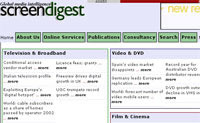 The growth of multimedia/web-enabled phones has supercharged consumer spending on downloadable mobile games, with sales growing from £380m (US$719m/€554m)in 2003 to £778m (US$1.4bnm/€1,134m) in 2004.
The growth of multimedia/web-enabled phones has supercharged consumer spending on downloadable mobile games, with sales growing from £380m (US$719m/€554m)in 2003 to £778m (US$1.4bnm/€1,134m) in 2004. A hard drive, containing confidential data belonging to the Brandenburg police in Germany, was auctioned over eBay and bought by a student from the city of Potsdam for €20 (us$25/£14) according to a report by Spiegel, a leading weekly German newspaper.
A hard drive, containing confidential data belonging to the Brandenburg police in Germany, was auctioned over eBay and bought by a student from the city of Potsdam for €20 (us$25/£14) according to a report by Spiegel, a leading weekly German newspaper. Last year, mobile security specialists Pointsec bought a load of hard drives off Internet auctions like eBay to find out how much sensitive company information they could unearth (and publicise their expertise in the bargain, natch).
Last year, mobile security specialists Pointsec bought a load of hard drives off Internet auctions like eBay to find out how much sensitive company information they could unearth (and publicise their expertise in the bargain, natch). Online retail giant Amazon.com has scooped up the ‘printing fulfillment’ company BookSurge, which maintains a catalogue of thousands of book titles available for users to print on demand.
Online retail giant Amazon.com has scooped up the ‘printing fulfillment’ company BookSurge, which maintains a catalogue of thousands of book titles available for users to print on demand. The company will now offer (cue: North American accent) “inventory-free book fulfillment” to publishers through BookSurge Publisher Services and to authors through BookSurge Publishing.
The company will now offer (cue: North American accent) “inventory-free book fulfillment” to publishers through BookSurge Publisher Services and to authors through BookSurge Publishing. Cappuccino-supping Hoxtonites will be cheered by new figures showing that online advertising spending grew by a thumping 60% in 2004, edging ahead of radio in terms of market share for the first time.
Cappuccino-supping Hoxtonites will be cheered by new figures showing that online advertising spending grew by a thumping 60% in 2004, edging ahead of radio in terms of market share for the first time. Online spending went against the overall general advertising trend, with total UK spend rising just 5.8% in 2004 to £16.9bn (US$31.7bn/€24.7bn) in 2004, based on figures from the Advertising Association and WARC.
Online spending went against the overall general advertising trend, with total UK spend rising just 5.8% in 2004 to £16.9bn (US$31.7bn/€24.7bn) in 2004, based on figures from the Advertising Association and WARC.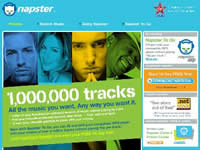 Napster UK has teamed up with Channel 4 to broadcast a short series of live TV music shows, creating the first national terrestrial television programme to be run by a digital music service.
Napster UK has teamed up with Channel 4 to broadcast a short series of live TV music shows, creating the first national terrestrial television programme to be run by a digital music service. Building up to a crescendo of mutual backslapping, Sharman added: “Channel 4 has a deserved reputation for groundbreaking and forward-looking programming as well as championing live music, so we’re delighted to make our TV debut on their platform. Napster is also extremely fortunate to have a partner like Blaze TV whose production skills, expertise and contact book have proven invaluable in creating this series.”
Building up to a crescendo of mutual backslapping, Sharman added: “Channel 4 has a deserved reputation for groundbreaking and forward-looking programming as well as championing live music, so we’re delighted to make our TV debut on their platform. Napster is also extremely fortunate to have a partner like Blaze TV whose production skills, expertise and contact book have proven invaluable in creating this series.” Video Networks, providers of the HomeChoice entertainment and communications service, has announced the addition of a brand new R.E.M. video-on-demand (VoD) channel to its platform.
Video Networks, providers of the HomeChoice entertainment and communications service, has announced the addition of a brand new R.E.M. video-on-demand (VoD) channel to its platform. While useful, this isn’t quite as slick as it sounds: if a viewer hears a track they want to buy, they have to click on the onscreen information button which will provide a number to text. A code is then sent back to them which they can enter when they log onto the Internet to download the music track. When we spoke to HomeChoice, they told us they were working on a more integrated way of getting pay-for content to their customers.
While useful, this isn’t quite as slick as it sounds: if a viewer hears a track they want to buy, they have to click on the onscreen information button which will provide a number to text. A code is then sent back to them which they can enter when they log onto the Internet to download the music track. When we spoke to HomeChoice, they told us they were working on a more integrated way of getting pay-for content to their customers.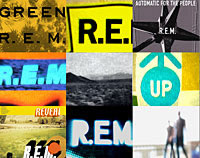 Roger Lynch, Chairman and Chief Executive, Video Networks Ltd said: “The addition of this on-demand channel is not only a true coup for R.E.M. fans but also ensures Video Networks continues to offer the most innovative music content on TV in the world today.”
Roger Lynch, Chairman and Chief Executive, Video Networks Ltd said: “The addition of this on-demand channel is not only a true coup for R.E.M. fans but also ensures Video Networks continues to offer the most innovative music content on TV in the world today.”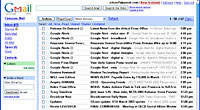 A year after its launch, Google has doubled the capacity of its Gmail service and added new features.
A year after its launch, Google has doubled the capacity of its Gmail service and added new features. Google is, however, aware that some crafty Gmail subscribers are using the service for this purpose, mailing files to themselves as a way of storing them online.
Google is, however, aware that some crafty Gmail subscribers are using the service for this purpose, mailing files to themselves as a way of storing them online.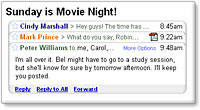 Curiously, Gmail is still technically in a beta phase, and is not generally available – the only way users can obtain a Gmail account is by invitation from an existing user (each current user has 50 invitations to give).
Curiously, Gmail is still technically in a beta phase, and is not generally available – the only way users can obtain a Gmail account is by invitation from an existing user (each current user has 50 invitations to give). The London Underground is to show digital advertising on its escalators for the first time, as part of a trial being handled by Viacom Outdoor.
The London Underground is to show digital advertising on its escalators for the first time, as part of a trial being handled by Viacom Outdoor. The trial is due to start within months, and if successful will be rolled out at other locations across the network.
The trial is due to start within months, and if successful will be rolled out at other locations across the network. In a shocking example of virtual life crashing into real life, a Shanghai online game player stabbed his gaming pal in the chest multiple times after he learned that he had stolen approximately US$870 (£462/€671) from the sale of a powerful “dragon sabre”, jointly owned by both players.
In a shocking example of virtual life crashing into real life, a Shanghai online game player stabbed his gaming pal in the chest multiple times after he learned that he had stolen approximately US$870 (£462/€671) from the sale of a powerful “dragon sabre”, jointly owned by both players.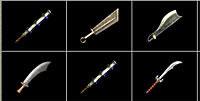 Still fuming, Chengwei popped around to have a word with Caoyuan who didn’t convince with his promises to pay him for the sword.
Still fuming, Chengwei popped around to have a word with Caoyuan who didn’t convince with his promises to pay him for the sword. However, online game companies in Shanghai – the city with the most players – are planning to set up a dispute system where aggrieved players can find recourse.
However, online game companies in Shanghai – the city with the most players – are planning to set up a dispute system where aggrieved players can find recourse.